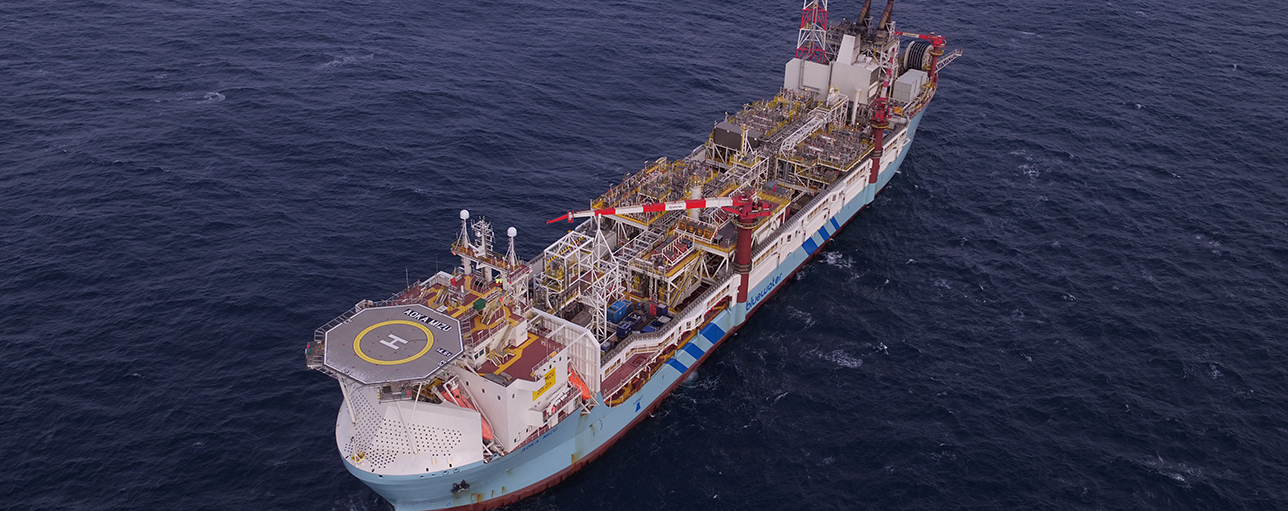DNV GL and FPSO specialist Bluewater are undertaking a pilot project to use hybrid digital twin technology to predict and analyze fatigue in the hull of an FPSO in the North Sea.

The project aims to validate and quantify the benefits of creating a virtual replica of the FPSO to optimize the structural safety of the vessel and enhance risk-based inspection (RBI), a decision-making methodology for optimizing inspection regimes. The pilot underpins Bluewater’s mission to take a proactive, responsible approach to safety and environmental care in its operations.
Bluewater’s Aoka Mizu FPSO, currently in operation in the Lancaster field, west of Shetland, will be used. To date, the pilot test has shown encouraging results.
DNV GL’s unique combination of domain experience, inspection capabilities and digital analytics and modelling, enables the monitoring of the asset’s hull structure during operation without dependence on costly routine inspection regimes. Termed ‘Nerves of Steel’, the underlying concept permits the use of various data sets (external environmental data or local sensor data) combined with digital models of the asset, to develop a hybrid replica model of the vessel’s structure. This can be used in real-time to monitor the asset’s condition, identify and monitor high risk locations, and plan targeted and cost-efficient maintenance and inspection activities.
Hybrid twin technology uses a combination of numerical design models and data from actively recorded strain gauge sensors on board the FPSO. These sensors allow for a full understanding of the accumulative loading and current state of the FPSO structure. The technology blends computer-simulated modelling with real-time data, which is then streamed to the operator via DNV GL’s Veracity data platform or an existing data transfer solution.
“By informing and enhancing the RBI process, operators can reduce operational costs and time, providing significant improvements in safety, thereby extending the lifespan and integrity of assets.
“With fluctuating oil price and the impact of Covid-19 on travel, delivering a mirror image of an asset from the safety of shore needs to be trusted and of value,” said Koheila Molazemi, Technology and Innovation Director, DNV GL – Oil & Gas.
DNV GL’s visual dashboard presents data to Bluewater on stresses in the hull’s structure, alongside information that can be used to identify areas with relative higher risk of cracks or deformities to occur. The information, which is constantly recorded, can be accessed and analyzed to inform decision-making and implement inspection based on risk priority.
The trial will expand on traditional FPSO integrity management strategies, which are based on software-based assumptions made at the design stage as well as current inspection record to enhance RBI decision-making. The pilot with Bluewater is expected to provide new insight and smarter ways of managing risks and costs related to structural integrity management.
This is DNV GL’s third pilot project evaluating the performance of hybrid digital twin technology. With global support from the advisor’s experts in Singapore, the UK and Norway, the first involved defining a repair procedure for a FPSO flare tower. Another trial, which is still ongoing, is being performed on a fixed offshore platform.
“Like an insurance policy, the hybrid digital twin can potentially save millions by avoiding the costly and possibly catastrophic repercussions of ill-informed integrity management by pre-empting and preventing detrimental damage. For an asset operating in a harsh environment, where the loads play an important part in the possible degradations of the asset, using data from the site as a basis for optimized inspection planning, alarms for extreme events and asset suitability for life extension is crucial,” added Francois-Xavier Sireta, Technical Lead for Naval Architecture and Principal Engineer, DNV GL – Oil & Gas.
Peter van Sloten, Department Head Technology Management, Bluewater said: “We [Bluewater] decided to extend our digital twin programme to include our FPSO Aoka Mizu. Our ambition for the structures largely matched with the novel digitalization services of DNV GL. We are therefore pleased to team up with DNV GL to develop a tool to monitor the structural integrity of this most versatile FPSO, designed and proven to operate in harsh environments with high uptimes and a maintained, strict regulatory and safety regime. This will enhance the safety and enables an optimized inspection regime.”
Source: DNV GL